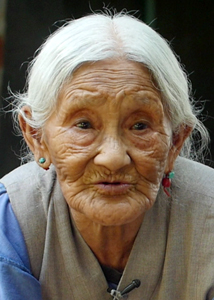Name: Phurbu Bhuti
(Alias: No)
Gender: Female
Interview Age: 88
Date of Birth: 1929
Birthplace: Khangmar, Utsang, Tibet
Year Left Tibet: 1959
Profession: Farming
Monk/Nun: No
Political Prisoner: No

Interview No.: 21U
Date: 2017-04-01
Language: Tibetan
Location: Rajpur, Uttarakhand, India
Categories: Culture and History
Keywords: childhood memories, Chinese -- first appearance of, customs/traditions, death/burial customs, farm life, houses/villages, tenant farmers, thamzing/struggle sessions, Utsang
Summary:
Phurbu Bhuti was born in Khangmar in Utsang Province to a large family of seven children. They were farmers and as the eldest child, she had many chores and responsibilities. She describes her daily routine and the family's three-room home. She had to collect water each day from a nearby river in wooden vessels. Her family was allotted land from a large estate and tenants like her family sowed the lands and collected manure as a tax in the form of service.
Phurbu Bhuti notes the absence of modern medical care and hospitals in Tibet. She describes in vivid detail the rituals performed at the time of one's death and the system of sky burial where bodies are fed to vultures. She was taught to chant prayers by her father and each night the entire family would say their prayers before dinner. She believes that boys were treated a little bit better than girls and had more independence.
When the Chinese first arrived, Phurbu Bhuti felt they were helpful. The situation changed rapidly after the Chinese began dividing the community into categories based on economic status and distributing property of the wealthy to the beggars. She witnessed the thamzing 'struggle sessions' of wealthy men. After being warned that middle class families like hers might be next, her family fled in the night leaving behind three of her siblings.
Interview Team:
- Marcella Adamski (Interviewer)
- Tenzin Yangchen (Interpreter)
- Tenzin Choenyi (Videographer)

